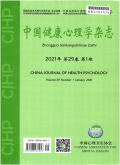中国健康心理学杂志2024,Vol.32Issue(4):525-531,7.DOI:10.13342/j.cnki.cjhp.2024.04.009
Heider平衡理论干预对血液透析患者心理负担和健康行为的影响
Influence of intervention on psychological burden and health behavior of hemodialysis patients based on Heider balance theory
摘要
Abstract
Objective:To explore the influence of intervention on psychological burden and health behavior of hemo-dialysis patients based on Heider balance theory.Methods:A total of 180 hemodialysis patients admitted to our hospi-tal from August 2020-October 2022 were enrolled in this study,the patients were divided into control group and study group according to admission order,90 cases in each group.The control group received routine intervention,while the study group received Heider balance theory intervention.Results:The health behavior(HPLP-Ⅱ),psycho-logical burden(SCL-90),The scores of compulsion,interpersonal sensitivity,hostility,terror,paranoia,psychosis and other dimensions were all decreased(P<0.05).The study group were lower than the control group(t=-11.156,-10.197,-6.780,-6.016,-6.378,-5.941,-3.125,-9.000,-4.633,-5.778;P<0.05),and the scores of study group were higher than those of control group(t=3.557,4.430,3.695,3.250,3.060,3.388,8.774;P<0.05).After the interven-tion,the scores of depression,anxiety and somatization in SCL-90 of the two groups decreased(P<0.05),and the scores in the study group were lower than those in the control group(t=-8.801,-4.759,-8.559;P<0.05).After the intervention,the scores of diet,exercise,medicine,fistula nursing,body weight control and regular dialysis in the self-management ability scale were higher than those before the intervention(P<0.05),and the scores in the study group were higher than those in the control group(t=8.249,2.147,9.198,8.106,13.697,10.142,21.536;P<0.05).After the intervention,the social function,role function,emotional function,somatic symptoms and the total scores of the scale were increased in both groups(P<0.05),and the study group was higher than the control group(t=4.956,8.523,4.907,6.191,11.964;P<0.05).The scores of professional skills,communication ability,ward management,nursing initiative and service attitude in the experimental group were higher than those in the control group(t=2.309,2.975,2.522,2.659,3.629;P<0.05).Conclusion:Heider balance theory intervention for hemodialysis patients has significant effect,which can reduce the psychological burden of patients,improve the health behavior of patients,but also can improve the self-management ability of patients,quality of life,and enhance the quality of intervention.关键词
Heider平衡理论/血液透析/心理负担/健康行为/生活质量Key words
Heider equilibrium theory/Hemodialysis/Psychological burden/Health behavior/Quality of life分类
医药卫生引用本文复制引用
王杨,邹霜,李莉娟,陈武..Heider平衡理论干预对血液透析患者心理负担和健康行为的影响[J].中国健康心理学杂志,2024,32(4):525-531,7.基金项目
湖北省自然科学基金(编号:232400410433) (编号:232400410433)

